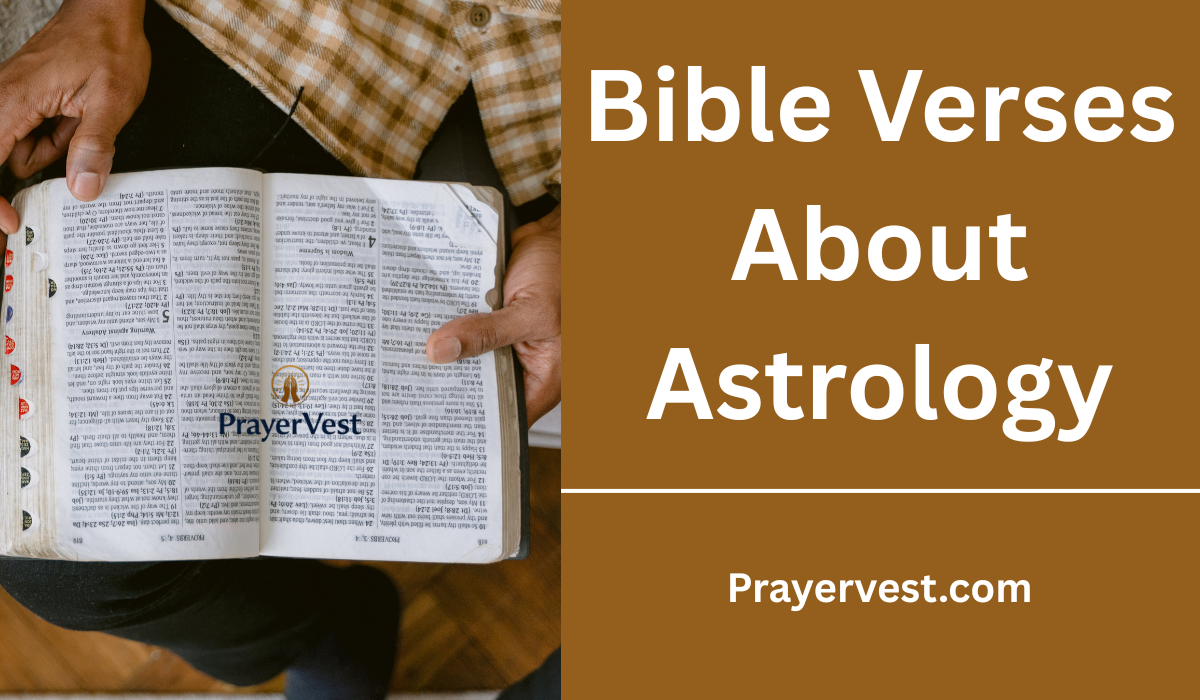For thousands of years, people have been captivated by astrology. There has always been a great desire to find meaning in the heavens, from ancient societies that studied the stars to contemporary people who seek guidance from horoscopes. Astrology is frequently used by people seeking identification, guidance, and comfort in the hopes that the movements of celestial bodies would unlock life’s secrets. Scripture makes a clear distinction between admiring the heavens and looking to them for divine guidance, even though creation does reflect God’s splendor.
The Bible regularly teaches that God created the stars and planets as symbols of His majesty rather than as sources of personal destiny or divine insight. The Creator alone has the power to direct human life, even though the constellations showcase His artistry. God forbids divination, fortune-telling, and any activity that seeks to acquire spiritual knowledge independently of Him throughout the Bible. This includes astrology, which blurs the distinction between wonder and worship by shifting confidence from the real God to made things.


Examining biblical passages pertaining to astrology enables Christians to comprehend God’s viewpoint on this antiquated custom and the reasons He exhorts them to depend solely on Him. These verses make it clear that seeking God by Scripture, prayer, and His Spirit—rather than through cosmic patterns or zodiac signs—is the path to true wisdom, direction, and purpose. Comprehending the biblical perspective enables Christians to recognize the splendor of the skies without granting them control over their own life. We embrace the One who not only created the world but also has our history, present, and future firmly in His hands when we look to God instead of the stars.
40 Inspiring Bible Verses About Astrology (2026)
1. Deuteronomy 18:10-12
“Let no one be found among you who sacrifices their son or daughter in the fire, who practices divination or sorcery, interprets omens, engages in witchcraft, or casts spells, or who is a medium or spiritist or who consults the dead. Anyone who does these things is detestable to the Lord.”
This passage directly warns against divination, including astrology, as practices that seek guidance outside of God. It establishes a clear boundary between seeking God’s wisdom and consulting created signs or stars for direction. The focus is on loyalty to God rather than reliance on celestial forces.
2. Isaiah 47:13-14
“All the counsel you have received has only worn you out! Let your astrologers come forward, those stargazers who make predictions month by month, let them save you from what is coming upon you.”
Isaiah warns against reliance on astrologers and stargazers. Even those skilled in interpreting the heavens cannot alter God’s decreed plans. This verse underscores the futility of placing trust in human methods of predicting the future.
3. Jeremiah 10:2-3
“This is what the Lord says: ‘Do not learn the ways of the nations or be terrified by signs in the heavens, though the nations are terrified by them.’”
Jeremiah cautions Israel against adopting pagan practices, including interpreting celestial signs for guidance. Astrology, common among surrounding nations, is presented here as a source of fear rather than divine understanding.
4. Daniel 2:27-28
“Daniel answered, ‘No wise man, enchanter, magician or diviner can explain to the king the mystery he has asked about, but there is a God in heaven who reveals mysteries.’”
Daniel distinguishes God’s revelation from human attempts at prediction. Astrology and divination are powerless compared to the knowledge given by God. True insight comes only from the Creator, not the stars or human calculation.
5. Psalm 33:6-9
“By the word of the Lord the heavens were made, their starry host by the breath of his mouth. He gathers the waters of the sea into jars; he puts the deep into storehouses. Let all the earth fear the Lord; let all the people of the world revere him.”
The psalm emphasizes God’s authority over the heavens. Stars are part of creation, not guides for human destiny. Worship and reverence belong to God alone, highlighting the futility of seeking astrological guidance.
6. Isaiah 47:13
“All the counsel you have received has only worn you out! Let your astrologers come forward, those stargazers who make predictions month by month, let them save you from what is coming upon you.”
Isaiah challenges reliance on astrology, highlighting its inability to provide true security or understanding. Despite the detailed calculations of astrologers, they cannot prevent God’s judgments or influence His plans. This underscores the Bible’s emphasis on trusting God’s sovereignty rather than human predictions.
7. Ezekiel 21:21
“For the king of Babylon will stop at the fork in the road, at the divination fork, to seek guidance with the arrows, to consult the idols, to look for omens.”
Ezekiel describes the futility of pagan divination practices, including seeking omens, which often included astrology. Leaders who relied on such methods were still subject to God’s ultimate authority. This verse emphasizes that human systems of prediction cannot override divine will.
8. Daniel 1:20
“In every matter of wisdom and understanding about which the king questioned them, he found them ten times better than all the magicians and enchanters in his whole kingdom.”
Daniel and his companions exemplify reliance on God rather than mystical practices like astrology. Their wisdom and discernment were granted by God, not the stars or occult knowledge. This distinction reinforces that true insight comes from divine revelation rather than human interpretation of celestial signs.
9. Amos 5:26-27
“You have lifted up the shrine of your king, the star of your god, which you made for yourselves. Therefore I will send you into exile beyond Damascus,” says the Lord, whose name is God Almighty.”
Amos condemns worship of celestial objects, highlighting how star-related idolatry—closely linked to astrology—leads people away from God. The passage warns that elevating created things to divine status results in judgment, showing that the heavens were made for God’s glory, not human prediction.
10. Job 31:26-28
“If I have regarded the sun in its radiance or the moon moving in splendor, so that my heart was secretly enticed and my hand offered them a kiss of homage, then these also would be sins to be judged.”
Job acknowledges the danger of giving undue reverence to celestial bodies. Astrology often attributes power to the sun, moon, and stars, which the Bible identifies as created entities. Job’s refusal to worship them demonstrates a heart committed to God alone rather than the created cosmos.
11. Deuteronomy 4:19
“And when you look up to the sky and see the sun, the moon, and the stars—all the heavenly array—do not be enticed into bowing down to them and worshiping things the Lord your God has apportioned to all the nations.”
This verse explicitly warns against celestial worship. Observing the heavens is natural, but attributing guidance or destiny to stars is a form of idolatry. God desires that His people trust Him directly, not the patterns of the cosmos.
12. Colossians 2:8
“See to it that no one takes you captive through hollow and deceptive philosophy, which depends on human tradition and the elemental spiritual forces of this world rather than on Christ.”
Paul cautions believers against philosophies rooted in astrology and other worldly systems. Reliance on cosmic forces or human tradition can lead away from Christ. True knowledge and guidance come through faith in Jesus, not celestial interpretation.
13. Leviticus 19:26
“Do not practice divination or seek omens.”
Leviticus commands God’s people to avoid all forms of divination, which includes astrology. Seeking guidance from stars or omens is prohibited because it relies on created things rather than the Creator. The focus is on trusting God’s direct instruction and guidance.
14. 2 Kings 21:6
“He sacrificed his son or daughter in the fire, practiced divination and witchcraft, sought omens, and consulted mediums and spiritists. He did much evil in the eyes of the Lord, arousing his anger.”
King Manasseh’s practices included divination and consulting spiritual forces, illustrating the dangers of turning to occult and astrological methods. The verse highlights God’s displeasure with such reliance on created signs rather than divine wisdom.
15. Isaiah 8:19
“When someone tells you to consult mediums and spiritists, who whisper and mutter, should not a people inquire of their God? Why consult the dead on behalf of the living?”
Isaiah contrasts God’s guidance with occult practices, including astrology. The emphasis is on seeking answers from God rather than relying on the stars or spirits. Consulting the heavens or mediums distracts from true divine direction.
16. Jeremiah 8:2
“They will be buried like dung on the ground; they will be exposed to the sun, the moon, and the stars, which they have loved and served, and which they have followed and consulted.”
Jeremiah highlights the consequences of placing trust in celestial bodies. Astrology, which involves following stars for guidance, is depicted as misdirected worship that leads to judgment. God warns against prioritizing created signs over Him.
17. Ezekiel 8:16
“In the room of the temple’s inner court, the Babylonians set up idols and worshiped the sun, moon, and stars.”
Ezekiel exposes the idolatry of the people, including celestial worship. Astrology is implicitly condemned here, as it elevates created objects to spiritual authority. True worship must honor God alone, not the heavens.
18. Acts 16:16-18
“Once when we were going to the place of prayer, we were met by a female slave who had a spirit by which she predicted the future. She earned a great deal of money for her owners by fortune-telling. She followed Paul and the others, shouting, ‘These men are servants of the Most High God, who are telling you the way to be saved.’”
This passage demonstrates the intersection of divination and exploitation. Predicting the future—similar to astrology—was used for profit rather than truth. Paul’s response shows that reliance on spirits or signs for guidance is incompatible with God’s kingdom.
19. Daniel 5:10-12
“The queen then came into the banquet hall and said to the king, ‘May the king live forever! Don’t be alarmed! Your advisors, the astrologers, enchanters, magicians, and diviners, have been brought in to read this writing and tell you what it means. But there is a God in heaven who reveals mysteries, and he has shown King Nebuchadnezzar what will happen in the future.’”
Even in a kingdom that highly valued astrology, Daniel shows that true revelation comes only from God. Human methods of predicting the future are limited, while God alone reveals ultimate truth.
20. Galatians 5:19-21
“The acts of the flesh are obvious: sexual immorality, impurity and debauchery; idolatry and witchcraft; hatred, discord, jealousy, fits of rage, selfish ambition, dissensions, factions and envy; drunkenness, orgies, and the like. I warn you, as I did before, that those who live like this will not inherit the kingdom of God.”
Paul groups witchcraft, which includes astrology and divination, among sinful acts. Seeking guidance outside God is inconsistent with life in the Spirit. This passage underlines that spiritual devotion must be directed toward God rather than human or cosmic systems.
21. Leviticus 20:6
“I will set my face against anyone who turns to mediums and spiritists to prostitute themselves by following them, and I will cut them off from their people.”
This verse warns against seeking guidance from supernatural sources outside of God. Astrology, which involves consulting celestial patterns for personal direction, falls under the broader category of forbidden divination. God demands exclusive loyalty and dependence on Him for wisdom.
22. Deuteronomy 17:3-5
“They have forsaken the Lord your God and have gone over to worship other gods, bowing down to them or serving them. You must bring them to your gates and stone them to death.”
The passage emphasizes the severity of turning to false sources for guidance. Astrology, like other forms of idolatry, substitutes created things for the Creator, and God commands His people to remain faithful and not be swayed by such practices.
23. Jeremiah 14:13-14
“Then I said, ‘Alas, Sovereign Lord! The prophets say to them, “You will not see the sword or famine. Peace and safety will reign.”’ The Lord replied, ‘The prophets are prophesying lies in my name. I have not sent them or appointed them or spoken to them. They are prophesying to you false visions, divination, idolatries and the delusions of their own minds.’”
God condemns false guidance, including divination and astrology. Those who trust in human or cosmic predictions are led astray, demonstrating that true direction can only come from God’s Word.
24. Micah 5:12
“I will destroy your witchcraft and you will no longer cast spells.”
Micah explicitly condemns witchcraft and related practices, which include astrology and occult divination. God promises to remove these influences, asserting His authority over deceptive systems that claim to predict or control the future.
25. Isaiah 2:6-8
“You, Lord, have abandoned your people, the descendants of Jacob. They are full of superstitions from the East, and they practice fortune-telling like the Philistines. Their land is full of silver and gold, and there is no end to their treasures. Their land is full of horses, and there is no end to their chariots. Their land is full of idols; they bow down to the work of their hands, to what their fingers have made.”
Isaiah warns against adopting foreign superstitions, including astrology and divination. God rejects trust in created things, emphasizing that wealth, idols, and celestial signs cannot replace Him as the source of guidance and protection.
26. Ezekiel 13:6-9
“Their visions are false and their divinations a lie. Even though they say, ‘This is what the Sovereign Lord says,’ I did not send them, and they expect people to believe their false words. Therefore this is what the Sovereign Lord says: I am against the false prophets who follow their own spirit and have seen nothing.”
False prophecy and divination, including astrology, are condemned as misleading. Trusting in human predictions or celestial patterns rather than God’s Word leads people away from truth and into deception.
27. Daniel 4:7
“The king told them, ‘I have had a dream that troubles me, and I want to know what it means.’ Then the astrologers, enchanters, magicians, and diviners came in and told the king the dream but could not interpret it for him.”
Even highly skilled astrologers and magicians were powerless before God’s revelation. Daniel demonstrates that interpretation and understanding come from God, not human calculation or cosmic observation.
28. Habakkuk 2:18
“Of what value is an idol carved by a craftsman? Or an image that teaches lies? For the one who makes it trusts in his own creation; he makes idols that cannot speak.”
Habakkuk highlights the futility of trusting in created things, including celestial objects used in astrology. Idols and stars cannot provide guidance, teaching, or salvation; only God offers true direction.
29. 1 Samuel 15:23
“For rebellion is like the sin of divination, and arrogance like the evil of idolatry. Because you have rejected the word of the Lord, he has rejected you as king.”
Disobedience and reliance on external sources, including divination and astrology, are equated with rebellion against God. This shows that trusting created signs instead of God is a serious spiritual offense.
30. 2 Chronicles 33:6
“He sacrificed his children in the fire in the Valley of Ben Hinnom, practiced divination and witchcraft, sought omens, and consulted mediums and spiritists. He did much evil in the eyes of the Lord, arousing his anger.”
King Manasseh’s reliance on divination and occult practices, including astrology, illustrates the danger of turning from God to created forces. The verse reinforces that guidance, protection, and wisdom belong to God alone.
31. Psalm 19:1-3
“The heavens declare the glory of God; the skies proclaim the work of his hands. Day after day they pour forth speech; night after night they reveal knowledge. They have no speech, they use no words; no sound is heard from them.”
The psalm emphasizes that while the heavens reflect God’s glory, they do not provide guidance or messages for human decisions. Astrology often misinterprets the created order as a source of instruction, but true knowledge comes from understanding God’s handiwork and Word, not from the stars themselves.
32. Jeremiah 8:2
“They will be exposed to the sun, the moon, and the stars, which they have loved and served, and which they have followed and consulted.”
Jeremiah condemns the worship and consultation of celestial bodies. Astrology, which attributes influence to stars, is shown here as a form of misplaced devotion that ultimately leads to ruin. God calls His people to seek Him above all else.
33. Isaiah 47:13
“All the counsel you have received has only worn you out! Let your astrologers come forward, those stargazers who make predictions month by month, let them save you from what is coming upon you.”
Isaiah ridicules the futility of astrology, noting that no calculation or prediction can avert God’s decreed plans. This verse stresses that human attempts to control the future through celestial signs are powerless against God’s sovereignty.
34. Daniel 2:27-28
“Daniel answered, ‘No wise man, enchanter, magician or diviner can explain to the king the mystery he has asked about, but there is a God in heaven who reveals mysteries.’”
Daniel distinguishes God’s divine revelation from human methods of prediction, including astrology. The verse highlights that true wisdom and understanding come solely from God, not from celestial observation or human interpretation.
35. Exodus 20:3-4
“You shall have no other gods before me. You shall not make for yourself an image in the form of anything in heaven above or on the earth beneath or in the waters below.”
The Ten Commandments forbid elevating any created object, including stars or planets, to divine status. Astrology, which attributes power or influence to heavenly bodies, violates this foundational command by placing trust in creation rather than the Creator.
36. Colossians 2:18
“Do not let anyone who delights in false humility and the worship of angels disqualify you. Such a person also goes into great detail about what they have seen; they are puffed up with idle notions by their unspiritual mind.”
Paul warns against being swayed by teachings that elevate created beings or celestial forces. Astrology often mirrors this temptation, presenting the cosmos as a source of hidden knowledge rather than focusing on Christ, who is the true source of wisdom.
37. Jeremiah 10:2-3
“Do not learn the ways of the nations or be terrified by signs in the heavens, though the nations are terrified by them.”
Jeremiah instructs God’s people not to imitate pagan nations in relying on celestial signs. Astrology, rooted in these practices, is depicted as fear-driven and misleading. God calls His people to seek Him directly rather than patterns in the sky.
38. Deuteronomy 18:14
“The nations you are about to dispossess listen to those who practice divination or sorcery. But as for you, the Lord your God has not permitted you to do so.”
God separates His people from pagan practices, including astrology. While surrounding nations seek guidance from stars or omens, God commands His followers to rely solely on His wisdom and Word.
39. 1 Chronicles 10:13-14
“Saul died because he was unfaithful to the Lord; he did not keep the word of the Lord and even consulted a medium for guidance. He did not inquire of the Lord, so he killed him and gave his kingdom to David son of Jesse.”
Saul’s reliance on a medium demonstrates the danger of seeking guidance outside God. Astrology operates on a similar principle—trusting created signs instead of God. The consequences of ignoring God’s direction are shown clearly in this example.
40. Proverbs 3:5-6
“Trust in the Lord with all your heart and lean not on your own understanding; in all your ways submit to him, and he will make your paths straight.”
Proverbs emphasizes wholehearted trust in God rather than human or cosmic systems. Astrology encourages reliance on self and stars, whereas this verse redirects focus to God’s guidance, promising true direction and wisdom when we submit to Him.
Conclusion
Scripture provides a solid foundation that guides believers back to the real source of wisdom—God Himself—in a society where astrology, horoscopes, and zodiac-based identities are becoming more and more common. The Bible encourages us not to rely on the stars for guidance, identity, or spiritual insight, but to appreciate the beauty of the heavens as a testament to God’s creativity. These verses serve as a reminder that all attempts to find direction outside of God ultimately result in uncertainty, whereas His Word offers serenity, truth, and clarity that no celestial chart can match.
Ultimately, the call of Scripture is to seek the Creator rather than creation. Only God is able to shape our purpose, guide our actions, and know our future. When we turn away from traditions like astrology and instead place our reliance totally in Him, we discover a deeper, more secure foundation for life. By grounding our hearts in God’s wisdom, we walk in the light He provides, led by the everlasting God who never changes, rather than by stars that change and fade.






